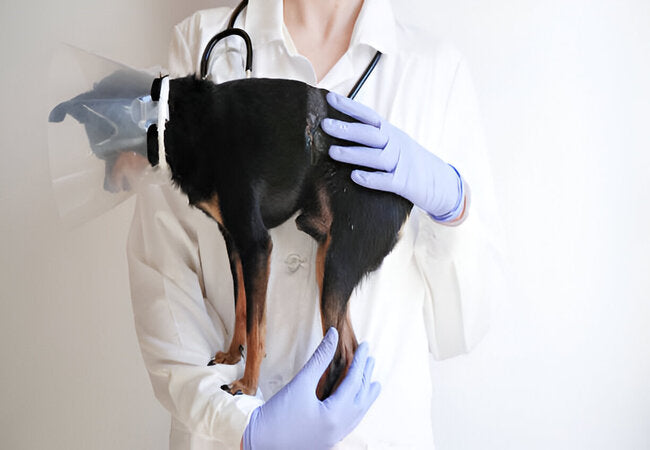Vet Guide to Canine Melanoma in 2025: Diagnosis, Treatment & Hope 🐾⚕️

In this article
Vet Guide to Canine Melanoma in 2025: Diagnosis, Treatment & Hope 🐾⚕️
By Dr. Duncan Houston BVSc
Melanoma is one of the most aggressive cancers in dogs. I'm Dr Duncan Houston BVSc, and in this comprehensive 2025 guide, I'll walk you through spotting signs, diagnosing accurately, using cutting‑edge treatments—including surgery, radiation, and immunotherapy—and supporting your dog’s wellbeing every step of the way. 🐶❤️
🔍 What Is Canine Melanoma?
Canine melanoma originates from melanocytes, the pigment-producing cells in skin and mucous membranes. It’s often dark-colored—but can be pink— and is known for rapid growth, bleeding, ulceration, and high metastatic potential, especially when located in the mouth.
Dogs are affected in several locations:
- Oral melanomas – the most common type (up to ~36% of oral tumors), aggressive and likely to spread.
- Digital/subungual melanomas occur in toes and nail beds, are painful, and often fracture bones.
- Ocular melanomas – affect eyelids or uvea; often benign yet still alarming.
- Cutaneous melanomas – skin bumps in hairy areas; less likely to be malignant.
🐶 Who Is at Risk?
Melanomas occur most often in middle‑aged to older dogs, especially heavily pigmented breeds such as Golden Retrievers, Schnauzers, Dachshunds, Poodles, and Scottish Terriers. Genetics, breed, and age are major risk factors; UV light plays a minor role in dogs, unlike in humans.
🚨 Clinical Signs to Watch
- Oral: bad breath, drooling, bleeding, difficulty eating, weight loss.
- Digital: swelling, limp, toenail loss, licking at toe.
- Ocular: visible masses, vision changes, discharge.
- Skin: new dark bump, ulcer, or non-healing patch.
If you notice any of these, schedule a veterinary appointment without waiting—oral or digital melanoma is a medical emergency.
🔬 Diagnostic Approach & Staging
Proper diagnosis involves:
- Physical exam and full oral/skin check.
- Cytology via fine-needle aspirate for preliminary diagnosis.
- Histopathology via biopsy to confirm malignancy and subtype.
- Staging tests: include lymph node aspirates, thoracic X-rays, abdominal ultrasound, CT or MRI if bone involvement is suspected.
Pathology reports include key prognostic markers: mitotic index, pigmentation, vascular invasion, ulceration, and Ki-67 expression.
✂️ Treatment in 2025
Surgery + Wide Margins
Wide‑margin excision is the frontline approach across all melanoma types, especially effective for skin or accessible mucosal tumors. Oral cases may require maxillectomy or mandibulectomy, often paired with lymph node removal.
Radiation Therapy
Essential for oral lesions post-surgery or when tumors are inoperable. Radiation significantly improves local control.
Chemotherapy
Carboplatin is commonly used in dogs with oral melanoma and high-risk stages—even though outcome improvements are modest.
Immunotherapy – Oncept® Vaccine
The USDA-approved DNA vaccine Oncept targets tyrosinase and is administered via needle-free devices. Best response occurs in stage II–III disease after local control. Side effects are minimal. A recent multi-center 5-year study showed encouraging safety and efficacy, with ongoing monitoring as of May 2024.
Emerging Therapies
New immunotherapies, including PD-1 and CTLA‑4 checkpoint inhibitors, are under research and show promise in extending survival. Clinical trials for melanoma vaccines are ongoing at several universities.
Palliative & Supportive Care
If treatment isn’t viable, focus shifts to pain relief, nutrition support, oral hygiene, and enrichment therapies. Ask A Vet recommends Woopf activity kits and Purrz calming supplements to support quality of life.
📆 Prognosis by Location
| Type | Median Survival* | Notes |
|---|---|---|
| Oral melanoma | 6–12 months | High metastasis rate (~80%), aggressive. |
| Digital melanoma | Variable; toe amputation may cure if early | 30–40 % metastasis by diagnosis. |
| Cutaneous melanoma | Often curative with surgery | Less aggressive behavior. |
| Ocular melanoma | Mostly benign | Still requires removal; may cause vision issues. |
*Actual outcomes vary depending on stage, breed, age, and treatment. Early detection and aggressive multimodal therapy = best chances.
🧩 Tips for Owners
- Perform monthly oral/oral tissue checks—look for lumps, discoloration, or odor.
- Don't delay evaluation of toe abnormalities—losing a nail could indicate melanoma.
- Ask about staging tests—catching the spread early improves outcomes.
- Support holistic recovery: anti-inflammatory diets, gentle physical activity, enrichment tools from Woopf and Purrz.
- Stay engaged with Ask A Vet follow-ups and symptom check-ins via the app to monitor challenges in recovery, appetite, oral pain, etc.
🌟 2025 Innovation Outlook
This year brings key advances:
- Wider use of checkpoint inhibitors alongside existing immunotherapies and vaccines.
- Real‑time canine melanoma genomic markers for personalized treatment.
- Refined delivery systems for the Oncept vaccine with better immune responses and fewer injections.
- Clinic-based AI histopathology to speed up diagnosis and staging.
✅ Final Thoughts
- Melanoma is aggressive, but early detection and multimodal treatment give dogs their best chances.
- Surgery with wide margins, combined with radiation, immunotherapy (Oncept), and possibly chemotherapy, offers the strongest treatment plan.
- Emerging immunotherapies such as checkpoint inhibitors show promise.
- Quality of life must remain front and center—palliative care and enrichment are essential.
- Partner with Ask A Vet for ongoing support: treatment reminders, symptoms checking, and accessing holistic care tools like Purrz and Woopf.
With knowledge, early action, and a compassionate plan, we can extend and enrich the lives of dogs facing melanoma in 2025 and beyond. 🐾






